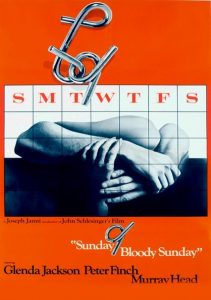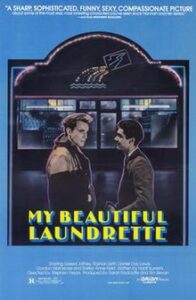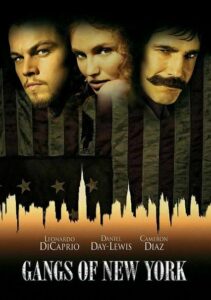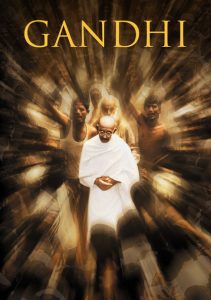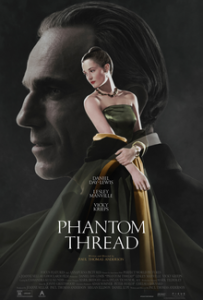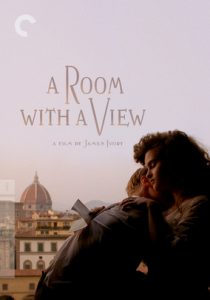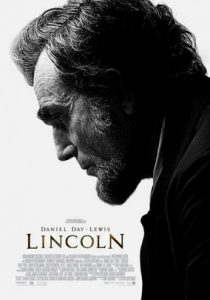Sunday Bloody Sunday-1971
Director John Schlesinger
Starring Glenda Jackson, Peter Finch, Murray Head
Top 250 Films #182
Scott’s Review #1,062
Reviewed September 15, 2020
Grade: A
Whether it’s the late 1960s style with British sophistication or the ahead-of-its-time subject matter, John Schlesinger’s Sunday Bloody Sunday (1971) is a brazen and mature piece of filmmaking.
With fantastic acting mostly from Glenda Jackson and Peter Finch, the film is subdued enough to contain the drama while letting the underlying plot marinate and flourish rather than being forced or overdone.
That’s not to say Sunday Bloody Sunday is an easy watch. The main characters stew and simmer rather than explode as the audience comes to grips with their feelings, emotions, and motivations, as painful as they can be.
Schlesinger offers the complexities of the characters as we get inside their heads across multiple scenes, with cameras carefully panning in on their facial expressions. The intention is to read their minds or think we know what they are thinking.
The three characters featured are Alex (Glenda Jackson), a divorced, restless recruitment worker; a young, free-spirited artist, Bob (Murray Head); and a gay, Jewish doctor, Daniel (Peter Finch).
Bob openly dates both Alex and Daniel, who are aware of each other and even have common friends. Instead of scheming against the other in hopes of poisoning their character with Bob, they deal with acceptance and a host of different emotions.
A triangle ensues, though not one with a clear couple to root for, nor is it clear who we want to root for. Sunday Bloody Sunday is not that trite or simplistic, and this is the beauty of the film.
Each character can be analyzed for individual motivations, peculiarities, and desires that sometimes overlap. The added perk of one character being straight, one character being bisexual, and one character being gay only adds flavor and lustful desire.
Sunday Bloody Sunday is a character study if ever there was one.
Screenwriter Penelope Gilliatt writes a piece so bristling with unpredictability that the characters and situations are deep and troubling. My favorite character is Daniel, the most adjusted of the three, but a character who would typically be written as the most maladjusted.
Schlesinger had directed the brilliant Midnight Cowboy (1969) two mere years earlier, a film that depicted gay characters as troubled and self-hating. Gilliatt crafts Daniel as confident, booming, and masculine, avoiding all stereotypes.
I immediately had thoughts of Ken Russell’s masterpiece, Women in Love, made only one year earlier in 1970, and starring Jackson. Both films, featuring four characters rather than only three, are British and explore the complexities of sexual orientation, jealousy, and loneliness.
Women in Love is a slightly better film, but only by a small margin, probably because it adds one additional character. Both explore and barely touch territory when it was still taboo to explore homosexuality in film.
Adorable is a scene at a Bar Mitzvah given to Daniel’s nephew. As the merriment commences, several women are bound to be interested in Daniel, what with him being a successful doctor. He doesn’t have any interest in it naturally, but he politely makes small talk with one woman.
The scene is so natural and at ease that it is terrific and reaffirming to see a gay character treated with such dignity and richness, his problems not being a result of being gay but of being a human being.
Daniel and Alex compete for Bob’s affection, but in a polite way. Instead of hating each other, they hate the situation. Bob is not the nicest guy in the world, so the question arises as to why they both feel the way they do about him.
But this hardly matters when the heart wants what it wants.
The most interesting and realistic scenes occur when each couple lies in bed together or when they make small talk over a meal. This offers a glimpse of the day-to-day treasures they could each enjoy.
Those in the mood for a film rife with emotion and psychologically complex feelings, wrapped in a good drama, will find Sunday Bloody Sunday (1971) a pure treat. Trimmings like glimpses of the gorgeous city of London lend added nuance.
Each time this film is viewed, it could easily be watched from the perspective of either Alex, Bob, or Daniel.
Oscar Nominations: Best Director-John Schlesinger, Best Actor-Peter Finch, Best Actress-Glenda Jackson, Best Original Screenplay
